unit5_Nelson_Mandela参赛教案设计
人教版高中英语必修一 教案: unit 5 Nelson Mandela--a modern hero Reading
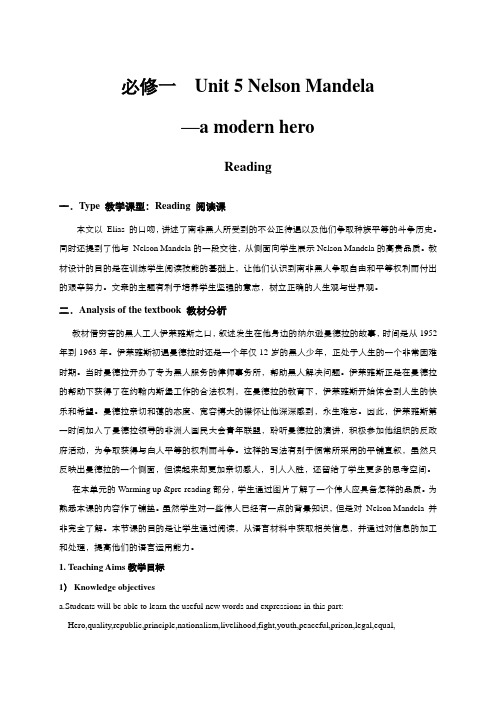
必修一Unit 5 Nelson Mandela—a modern heroReading一.Type 教学课型:Reading 阅读课本文以Elias 的口吻,讲述了南非黑人所受到的不公正待遇以及他们争取种族平等的斗争历史。
同时还提到了他与Nelson Mandela的一段交往,从侧面向学生展示Nelson Mandela的高贵品质。
教材设计的目的是在训练学生阅读技能的基础上,让他们认识到南非黑人争取自由和平等权利而付出的艰辛努力。
文章的主题有利于培养学生坚强的意志,树立正确的人生观与世界观。
二.Analysis of the textbook 教材分析教材借穷苦的黑人工人伊莱雅斯之口,叙述发生在他身边的纳尔逊曼德拉的故事,时间是从1952年到1963年。
伊莱雅斯初遇曼德拉时还是一个年仅12岁的黑人少年,正处于人生的一个非常困难时期。
当时曼德拉开办了专为黑人服务的侓师事务所,帮助黑人解决问题。
伊莱雅斯正是在曼德拉的帮助下获得了在约翰内斯堡工作的合法权利,在曼德拉的教育下,伊莱雅斯开始体会到人生的快乐和希望。
曼德拉亲切和蔼的态度、宽容博大的襟怀让他深深感到,永生难忘。
因此,伊莱雅斯第一时间加入了曼德拉领导的非洲人国民大会青年联盟,聆听曼德拉的演讲,积极参加他组织的反政府活动,为争取获得与白人平等的权利而斗争。
这样的写法有别于惯常所采用的平铺直叙,虽然只反映出曼德拉的一个侧面,但读起来却更加亲切感人,引人入胜,还留给了学生更多的思考空间。
在本单元的Warming up &pre-reading部分,学生通过图片了解了一个伟人应具备怎样的品质。
为熟悉本课的内容作了铺垫。
虽然学生对一些伟人已经有一点的背景知识,但是对Nelson Mandela 并非完全了解。
本节课的目的是让学生通过阅读,从语言材料中获取相关信息,并通过对信息的加工和处理,提高他们的语言运用能力。
1. Teaching Aims教学目标1)Knowledge objectivesa.Students will be able to learn the useful new words and expressions in this part:Hero,quality,republic,principle,nationalism,livelihood,fight,youth,peaceful,prison,legal,equal,law,advise,continue,gold,passbook,ANC,league,stage,vote,position,accept,violence,devote,vote, guidance, blow up, in troubleb. Enable the students to read Elias’ storyc. Guide the students to know the qualities of Nelson Mandela as a great leader2) Ability objectivesa.Develop the students ’reading skills, such as fast reading ,careful reading and summarizingb.Improve the students’ comprehension ability3) Emotion objectivesa,Understand the qualities great person have in common and learn the fine qualities from themb.Develop the students’ moral quality2.Teaching important points教学重点a.Enable the students to read Elias’ story and Learn to grasp the main idea of the text.b.Enable students to talk about the fine qualities of great people,especially Nelson Mandelac.Improve the students’ reading ability3.Teaching difficult points 教学难点a.How to grasp the main idea of the text.b.How to help develop students’ reading abilityc.How to help students learn from Nelson Mandela4.Teaching methods 教学方法a.Student-centeredb.Task-based teaching method(任务型教学)c.Discussion5.Learning methods 学习方法Individual or pair work and group work6.Teaching Aids 教具准备The multimedia三.教学设计1. 总体思路本堂课的主要内容分为四大部分,Pre-reading(阅读前活动) ,while –reading(阅读中活动),post-reading(阅读后活动)以及discussion(讨论) and role play 。
人教版高一Unit5 Nelson Mandela说课稿

Unit5 Nelson Mandela—a modern hero说课稿各位老师:大家好!我是XX号考生顾雨,来自河南财经政法大学成功学院。
我今天所说的课题是高中一年级英语上册第5单元Nelson Mandela—a modern hero。
我说课的内容包括五部分,包括教材分析,学生分析,教学方法,教学过程和板书设计。
一、教材分析1.教材内容分析今天我说课的内容是高一英语必修1第五单元Nelson Mandela—a modern hero.,本单元讨论的话题是“great people”介绍了几位伟人的生平和伟人身上的品质,主要内容是围绕当代英雄纳尔逊曼德拉展开的。
通过学习本单元内容,学生学习伟大人物的优秀品质,不断提高自身的品格修养。
2、教学目标分析新课标提出了立体三维教学目标,本课我设计的教学目标如下:1)知识目标:熟悉本课的一些新单词,短语和句型。
语法方面掌握语法方面掌握以where,when,why,介词+which,介词+whom引导的定语从句2)能力目标:训练学生的阅读技巧(略读、寻读等),形成用英语获取信息、处理分析信息的能力。
并鼓励学生开口说英语。
3)情感态度目标:①通过学习激发学生对英语学习的浓厚兴趣;②使学生在领会语言丰富多彩性的同时学习伟大人物的优秀品质,不断提高自身的品格修养。
③通过对课文学习的小组讨论等形式,帮助学生养成团结、协作的品质。
3、教学重点、难点:1)教学重点:①让学生熟悉与本话题相关的一些重点单词、短语。
②提高学生的阅读能力,掌握多种阅读方法,如寻读,精读,理解等。
2)教学难点:对阅读中所获取的信息进行加工学习,形成有效的学习策略。
鼓励学生开口说英语。
二、学生分析高一年级的学生已经在初中阶段的英语学习中,已经积累了一定的词汇基础,并掌握了一些简单的学习策略和技巧,具有初步的英语听说读写能力。
但学生的英语水平参差不齐,教学既要进一步培养尖子的学习能力又要保证能力稍弱的学生能听懂,调动他们的积极性,使他们愿意学,在学习的过程中享受到乐趣。
Unit5NelsonMandela教案设计
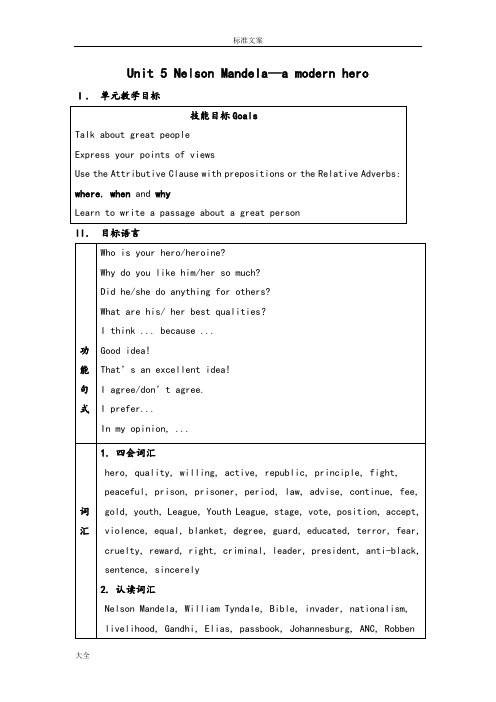
Unit 5 Nelson Mandela—a modern hero I.单元教学目标II.目标语言III. 教材分析和教材重组I. 教材分析本单元以Nelson Mandela —— a modern hero 为话题,目的在于使学生了解一个伟大的人应具备怎样的品质,学会表达自己的观点,并用所学的句型来描写一个伟人。
1.1 Warming Up列出一些形容词让学生判断一下哪些可以用来描述伟大的人,一个伟大的人应具备怎样的品质。
1.2 Pre-reading给学生提供了六个名人的图片,要求利用图片下面标注的人物的重要事迹以及学生对他们的了解,来判断这六个人谁是伟人,谁是重要的人但不是伟人。
1.3 Reading介绍Elias的生平,向学生展示Nelson Mandela是一个怎样的人。
这是一篇记叙文,让学生学会利用时间顺序描述一个人一生的主要活动。
1.4 Comprehending练习1和3帮助学生利用判断正误和时间顺序来整体理解课文。
练习2和4要求学生进一步了解课文细节。
1.5 Learning about Language分词汇和语法两部分。
其中Discovery useful words and expressions是根据课文语境在运用中掌握词汇,Grammar是有关关系副词where, when, why以及“介词+关系代词”引导定语从句的用法,并通过练习加以巩固。
1.6 Using Language分为三部分,一是Listening,练习听力可配合P72的Listening Task进行。
二是Reading,这也是一篇精读文章,更详细地了解曼德拉。
三是Writing,要求利用时间顺序简要地描述一个人。
2. 教材重组2.1 因本教材重点强调的是阅读能力,故将Reading, Comprehending,Using Language 中的Reading合在一起设计成一节“阅读课”(一)(精读课)。
Unit5NelsonMandela----amodernhero教学设计新部编版

精选教课教课设计设计| Excellent teaching plan教师学科教课设计[ 20–20学年度第__学期]任教课科: _____________任教年级: _____________任教老师: _____________xx市实验学校Unit 5 Nelson Mandela---- a modern heroKey Words(一 ). Words Review1._______ n. 质量;质量;性质2._______ adj. 小气的;自私的;鄙俗的 V. 意味,打算3.generous adj. _______;_______4._______ Vt. 建设,成立 ; _________ (过去式 )5._______ Vi. 逃脱,逃脱,泄漏 n. 逃脱,逃脱6._______ n. 建议,见解,主张7.principle n. ____,____,____8. relative n. ____,____; adj. ______;______9. ________ Vt. 攻击,攻击,抨击 n.攻击,攻击,抨击10. selfish adj.______→________ adj. 无私的11. _______ adj.愿意的→_________ adj. 不愿意的12. legal adj. ____,____→ _______ adj. 违纪的13._______ adj.踊跃的;活跃的→________ adv.踊跃地→ _______ n.活动14._______ Vt.献身;专心于→_________ n.奉献→_________ adj.忠实的,深爱的15.________ adj和.平的;沉静的;平和的→______ n.和平16.________ adj怀.有希望的;有希望的→ _________无望的,没希望的→______n. & v .希望17.______ adj相.等的,同样的→_______adv相.等地→________ n.同样,同样18._______ Vt.教育;训练→_______ adj.受过教育的;有修养的→________ n.教育(二 ). Key Words from Mr. Yang’s Adventure1.quality(1)质量好 /坏: of _____/ _____/ _____ quality(2)have a quality/ qualities of (doing) sth.: _______________________E.g. It is said that Volkswagen is of well quality. (改错 )他具备了成为一名优异学生的全部质量。
unit5NelsonMandela(教学设计)
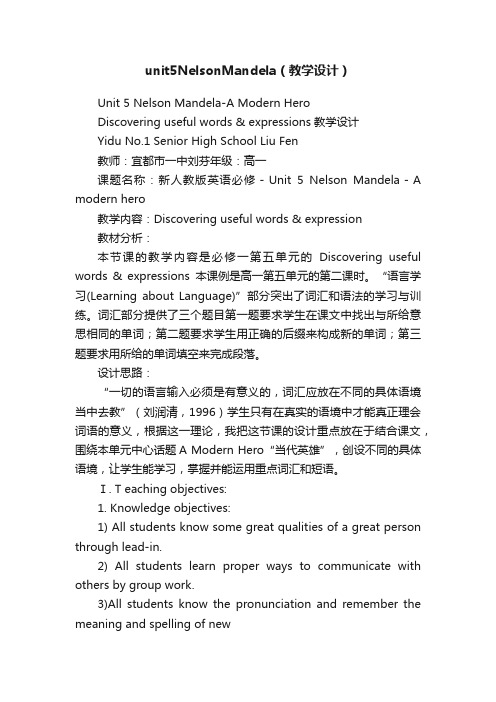
unit5NelsonMandela(教学设计)Unit 5 Nelson Mandela-A Modern HeroDiscovering useful words & expressions教学设计Yidu No.1 Senior High School Liu Fen教师:宜都市一中刘芬年级:高一课题名称:新人教版英语必修-Unit 5 Nelson Mandela-A modern hero教学内容:Discovering useful words & expression教材分析:本节课的教学内容是必修一第五单元的Discovering useful words & expressions本课例是高一第五单元的第二课时。
“语言学习(Learning about Language)”部分突出了词汇和语法的学习与训练。
词汇部分提供了三个题目第一题要求学生在课文中找出与所给意思相同的单词;第二题要求学生用正确的后缀来构成新的单词;第三题要求用所给的单词填空来完成段落。
设计思路:“一切的语言输入必须是有意义的,词汇应放在不同的具体语境当中去教”(刘润清,1996)学生只有在真实的语境中才能真正理会词语的意义,根据这一理论,我把这节课的设计重点放在于结合课文,围绕本单元中心话题A Modern Hero“当代英雄”,创设不同的具体语境,让学生能学习,掌握并能运用重点词汇和短语。
Ⅰ. T eaching objectives:1. Knowledge objectives:1) All students know some great qualities of a great person through lead-in.2) All students learn proper ways to communicate with others by group work.3)All students know the pronunciation and remember the meaning and spelling of newwords: principle, willing, guidance, devoted, quality, hopeful, violence, attack, lawyer, generous, equal, selfless by individual and group work.2. Ability objectives:1)All students know the skills to enlarge their vocabulary by adding some prefixes and suffixes.2)Most students can communicate with others about their heroes or heroines in their hearts.3)Most students can make up some correct sentences using the following new phrases: be devoted to doing, be hopeful about/of, as a matter of fact, out of work, in trouble, turn to somebody for something by group work.3. Emotion objectives:1. Students will be interested in word study through many kinds of interesting pictures,exercises and games.2. Students will learn some noble qualities from different kinds of heroes. And they also willbe aware of the importance of cooperation and teamwork and the fact that everyone can be a hero.Ⅱ.T eaching important points:1. To teach them the new words and phrases by many kinds of interesting pictures, exercisesand games.2. To teach them how to use new words and phrases correctly.Ⅲ. T eaching difficult points:1. How to develop students’ skills needed in daily communication.2. How to make students fully understand the importance of learning some good qualities from heroes andtry to be heroes.Ⅳ. T eaching approac hes:1. Group work2. Task-based approach3. DiscussingⅤ. Teaching procedures:Step 1 Lead-inHave a free talk with students and introduce the topic-hero to them by showing them some interesting pictures.Step 2 W ord study1) Teach some new words and phrases by showing them some interesting pictures.2) Invite students to read the words after the teacher and review some new words andphrases included in the story by showing some relative interesting pictures.Step 3 Read & RememberAllow students about 2 minutes to read and remember the words and phrases and1) Encourage students to match the word with the meaning!1. guidance have difficulty in doing sth2. out of work not having a job3. devoted help and advice given to sb4. principle basic general truth5. generous having hope6. equal the same in value, number.7. in trouble showing great love8. attack try to hurt or damage9. lawyer a person who can offer help about law10. hopeful ready to give freely2) Invite students to fill in the blanks in El ias’ story using the given words.Elias’ StoryNelson Mandela was a black_____ who was _______to helping black people, offering _______ to them on problems in law. when they are_______. I often worried about my job, because I was not _____ to get _____work. Luckily, he was _______ with time, helping me to be more ______about my job and future.To make black and white people ____, he often ________the laws with_violence___. ______As a matter of fact___, it was not the best way. But He was put into a position where he had to. He was the ______of black people.3)Invite students to choose words and make up a short story about their heroes orgiven to them to learn and enjoy.Sample:The heroine in my heart is my mother, who is around me giving me more love t han others. As a matter of fact, she isn’t great in the way of a famous singer or a movie star and does nothing big. But from her, I learn a lot.She brought me up with care although she was once out of work. Whenever I am in trouble, she will always be willing to help me out of trouble,offering me guidance and trying to cheer me up. Besides, as a teacher, she is devoted to the progress of her dear students as well.My mother is a loving mother, a selfless teacher, and a real heroine in my heart. Step 5 Games & RevisionAfter learning the words and phrases and doing some relative exercises, it’s necessary for students to get relaxed, reviewing at the same time.1)Let me guess:(within 3 minutes)(one word, one point):Student A explain in English or use body languageStudent B guess1. lawyer2. guidance3. heroine4. attack5. devote6. out of work7. equal 8. active 9. violent 10.willing 11. hopeful 12. devoted13.in trouble 14. generous2) List at least 6 words or phrases learnt today3) Spell the words below①指导(n)②忠实的,深爱的(adj)③(怀)有希望的(adj)④原则(n)4)Translate the sentence using “ be devoted to…”事实上,那个律师一生都会致力于帮助别人.Step 6 Consolidation & SummaryAsk students to think about a question “Where a hero really lies?”, and then invite to enjoy and follow a song“hero”. After hearing, ask students the same question again to give students a moral lesson---The hero lies in you! Everyone can be a hero!( the lyrics of the song will be given to them before the class) It's a long road 漫漫长路When you face the world alone 当你独自面对世界No one reaches out a hand 没有人伸出手For you to hold 让你握住Y ou can find love 你一定能找到爱If you search within yourself 如果能在自己身上找到勇气And the emptiness you felt 你曾感到的空虚Will disappear 将会消失And then a hero comes along 会有一位英雄向你走来With the strength to carry on 带着继续奋斗的力量And you cast your fears aside 你会把恐惧抛开And you know you can survive 你知道自己能挺过来So when you feel like hope is gone所以当你感到希望似乎破灭Look inside you and be strong 审视自己,保持坚强And you'll finally see the truth 最终你将明白That a hero lies in___ 英雄气魄就在__身上Step 8 Assessment教学反思:1.在这节课上,始终围绕“当代英雄”这一话题,创设具体语境,把书本与我们的生活结合起来,让学生明白拥有这些品质并不是伟人所特有的,通过树立正确的人生观,提高自我素质。
Unit_5_Nelson_Mandel_-_a_mod_教学设计_教案1
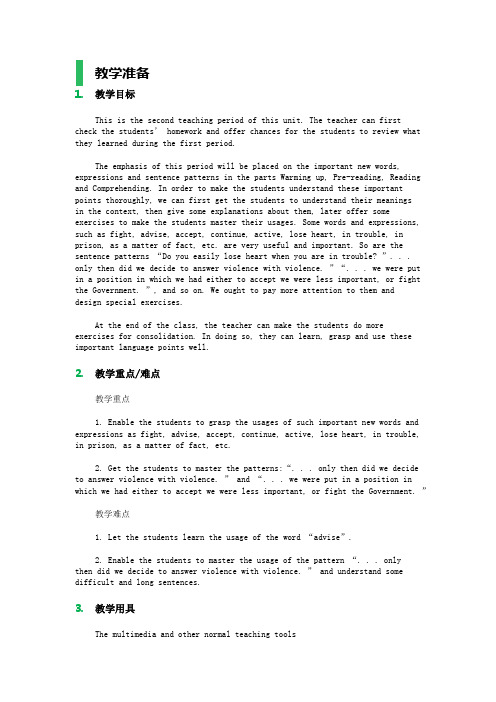
教学准备1. 教学目标This is the second teaching period of this unit. The teacher can first check the students’ homework and offer chances for the students to review what they learned during the first period.The emphasis of this period will be placed on the important new words, expressions and sentence patterns in the parts Warming up, Pre-reading, Reading and Comprehending. In order to make the students understand these important points thoroughly, we can first get the students to understand their meaningsin the context, then give some explanations about them, later offer some exercises to make the students master their usages. Some words and expressions, such as fight, advise, accept, continue, active, lose heart, in trouble, in prison, as a matter of fact, etc. are very useful and important. So are the sentence patterns “Do you easily lose heart when you are in trouble? ”. . . only then did we decide to answer violence with violence. ”“. . . we were put in a position in which we had either to accept we were less important, or fight the Government. ”, and so on. We ought to pay more attention to them anddesign special exercises.At the end of the class, the teacher can make the students do more exercises for consolidation. In doing so, they can learn, grasp and use these important language points well.2. 教学重点/难点教学重点1. Enable the students to grasp the usages of such important new words and expressions as fight, advise, accept, continue, active, lose heart, in trouble, in prison, as a matter of fact, etc.2. Get the students to master the patterns:“. . . only then did we decide to answer violence with violence. ” and “. . . we were put in a position in which we had either to accept we were less important, or fight the Government. ”教学难点1. Let the students learn the usage of the word “advise”.2. Enable the students to master the usage of the pattern “. . . onlythen did we decide to answer violence with violence. ” and understand some difficult and long sentences.3. 教学用具The multimedia and other normal teaching tools4. 标签Unit 5 Nelson Mandela教学过程→Step 1 Revision1. Check the homework exercises.2. Ask some students to retell the reading passage Elias’ Story.→Step 2 Reading and findingGet the students to read the reading passage again to underline all the new words and useful expressions or collocations in the passage.Collocations:a poor black worker, South Africa, a very difficult period of one’s life, open a law firm, advise sb. on. . . , three kilometers away, pay the school fees, the bus fare, get a job, a gold mine, be worried about, out of work, one of the happiest days of one’s life, the ANC Youth League, as soon as one could, have almost no rights at all, grow food, in fact, break the law, with violence, as a matter of fact, blow up, put. . . in prison, be happy to do. . . , realize one’s dreamRead them aloud and copy them down in the exercise book after class.→Step 3 Discovering useful words and expressionsShow the following form on the screen and allow the students several minutes to finish them.1. Look at the reading passage again to find words and expressionsthat mean the same.Alternative expressions Words and expressions from the textgroup of people organized for a special purposefeel hopelesslose one’s jobbrave manin facthave some difficult problemsbe taken to prisonsome timebe ready tomoney paid for going to schooltell somebody what to dogo onalways doing new thingswhat people do in wara yellow metal for making a ringagree to takego against a lawquiet and calm2. Complete the following passage with some of the words or expressions above.When Elias lost his job and was______________, his wife was very unhappy. She knew this meant he was______________ when all she wanted was a______________ life with enough money every month. She triedto______________ him not to fight the government as she thought it was better to______________ that in South Africa black people were not as important as white people. But he was willing to______________ the fight and help Nelson Mandela with equal rights for black people. For a______________ of time she felt helpless and______________, but Elias encouraged her with stories of how good life would be when white and black people and played together.Explain the problems the students meet while checking the answers.Suggested answers:1.Alternative expressions Words and expressions from the textgroup of people organized for a special purpose leaguefeel hopeless lose heartlose one’s job out of workbrave man heroin fact as a matter of facthave some difficult problems be in troublebe taken to prison be put in prisonsome time periodbe ready to willingmoney paid for going to school school feestell somebody what to do advisego on continuealways doing new things activewhat people do in war fighta yellow metal for making a ring goldagree to take acceptgo against a law break the lawquiet and calm peaceful2:out of work; in trouble; peaceful; advise; accept; continue; period; lost heart→Step 4 Language Points1. quality n. something typical of a person or material质量(不可数);品质,性质(可数);才能(可数)Quality is more than quantity.质量比数量重要。
人教版高中英语必修第一册 《Unit 5:Nelson Mandela 》教案
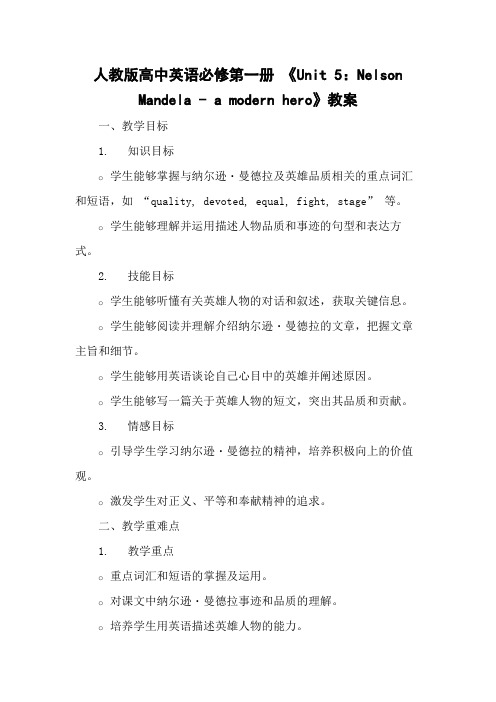
人教版高中英语必修第一册 《Unit 5:Nelson Mandela - a modern hero》教案一、教学目标1.知识目标o学生能够掌握与纳尔逊・曼德拉及英雄品质相关的重点词汇和短语,如 “quality, devoted, equal, fight, stage” 等。
o学生能够理解并运用描述人物品质和事迹的句型和表达方式。
2.技能目标o学生能够听懂有关英雄人物的对话和叙述,获取关键信息。
o学生能够阅读并理解介绍纳尔逊・曼德拉的文章,把握文章主旨和细节。
o学生能够用英语谈论自己心目中的英雄并阐述原因。
o学生能够写一篇关于英雄人物的短文,突出其品质和贡献。
3.情感目标o引导学生学习纳尔逊・曼德拉的精神,培养积极向上的价值观。
o激发学生对正义、平等和奉献精神的追求。
二、教学重难点1.教学重点o重点词汇和短语的掌握及运用。
o对课文中纳尔逊・曼德拉事迹和品质的理解。
o培养学生用英语描述英雄人物的能力。
2.教学难点o如何帮助学生深入理解纳尔逊・曼德拉的精神内涵,并能用英语准确表达。
o引导学生在写作中展现对英雄概念的深刻思考。
三、教学方法1.人物分析法:深入剖析纳尔逊・曼德拉的形象和品质。
2.故事讲述法:通过讲述曼德拉的故事,吸引学生兴趣。
3.启发式教学法:启发学生思考英雄的定义和价值。
四、教学过程(一)导入(5 分钟)1.展示纳尔逊・曼德拉的图片,提问学生是否了解他。
2.简单介绍纳尔逊・曼德拉的背景,引发学生的兴趣。
(二)词汇学习(10 分钟)1.呈现本单元的重点词汇和短语,结合曼德拉的事迹进行讲解。
2.通过词汇游戏,如猜词、接龙等,巩固词汇记忆。
(三)阅读前准备(5 分钟)1.让学生思考 “什么是英雄”,并列举一些他们认为的英雄。
2.提出问题引导学生对课文内容进行预测,如:What do you think this passage will talk about Nelson Mandela?(四)课文阅读(15 分钟)1.学生快速阅读课文,概括曼德拉的主要经历。
Unit?5?Nelson?Mandela教案
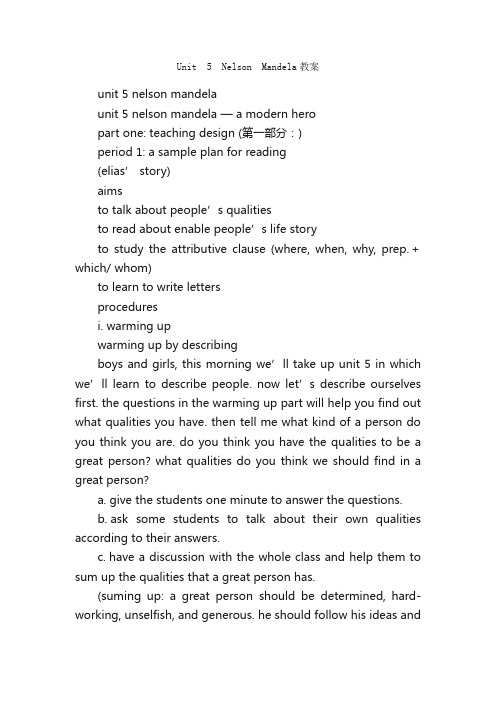
Unit 5 Nelson Mandela教案unit 5 nelson mandelaunit 5 nelson mandela — a modern heropart one: teaching design (第一部分:)period 1: a sample plan for reading(elias’ story)aimsto talk about people’s qualitiesto read about enable people’s life storyto study the attributive clause (where, when, why, prep.+which/ whom)to learn to write lettersproceduresi. warming upwarming up by describingboys and girls, this morning we’ll take u p unit 5 in which we’ll learn to describe people. now let’s describe ourselves first. the questions in the warming up part will help you find out what qualities you have. then tell me what kind of a person do you think you are. do you think you have the qualities to be a great person? what qualities do you think we should find in a great person?a. give the students one minute to answer the questions.b. ask some students to talk about their own qualities according to their answers.c. have a discussion with the whole class and help them to sum up the qualities that a great person has.(suming up: a great person should be determined, hard-working, unselfish, and generous. he should follow his ideas andnever lose heart when he is in trouble. he usually gives up something to achieve his goals. he should be willing to do public service work without pay, be active in social activities, gets on well with others, and help others, etc.)warming up by brainstormingboys and girls, in unit 5 we will talk about nelson mandela, a great leader who fights for the rights of the black people. when talking about a person, what adjectives can you think of to describe his or her qualities? what are the qualities you should find in a great person?(adjectives for describing a person: kind, honest, brave, loyal, happy, wise, smart, friendly, warm, cheerful, popular, generous, hard-working, diligent, weak, stupid, lazy, dishonest, mean, tense, cold, unkind, miserable, dull, strong-minded, determined,) warming up by expressionsboys and girls, we are going to learn about some great people in unit 5. can you name some great people? now discuss in groups of four: who do you admire most? what kind of person is he/she? what are the qualities that great people have in common?sun yat-sen (november 12, 1866–march 12, 1925) was a chinese revolutionary leader and statesman who is considered by many to be the “father of modern china”. he had a significant influence in the overthrow of the qing dynasty and establishment of the republic of china. a founder of the kuomintang, sun was the first provisional president of the republic of china in 1912 and de facto leader from 1923 to 1925. he developed a political philosophy known as the three principles of the people. sun is uniquely admired by most chinese. yet, his life was one of constant struggle and frequent exile as few of his visions for hiscountry materialized.。
Nelson-Mandela教学设计
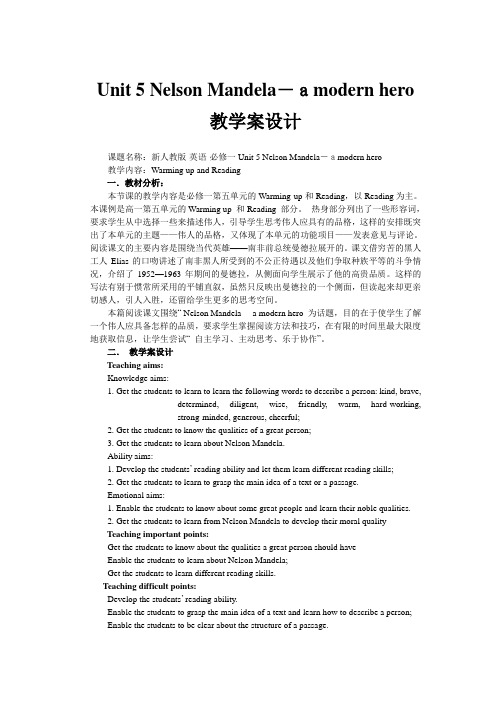
Unit 5 Nelson Mandela-amodern hero教学案设计课题名称:新人教版-英语-必修一Unit 5 Nelson Mandela-amodern hero教学内容:Warming up and Reading一.教材分析:本节课的教学内容是必修一第五单元的Warming-up和Reading,以Reading为主。
本课例是高一第五单元的Warming up 和Reading 部分。
热身部分列出了一些形容词,要求学生从中选择一些来描述伟人,引导学生思考伟人应具有的品格,这样的安排既突出了本单元的主题——伟人的品格,又体现了本单元的功能项目——发表意见与评论。
阅读课文的主要内容是围绕当代英雄——南非前总统曼德拉展开的。
课文借穷苦的黑人工人Elias的口吻讲述了南非黑人所受到的不公正待遇以及他们争取种族平等的斗争情况,介绍了1952—1963年期间的曼德拉,从侧面向学生展示了他的高贵品质。
这样的写法有别于惯常所采用的平铺直叙,虽然只反映出曼德拉的一个侧面,但读起来却更亲切感人,引人入胜,还留给学生更多的思考空间。
本篇阅读课文围绕“ Nelson Mandela----a modern hero 为话题,目的在于使学生了解一个伟人应具备怎样的品质,要求学生掌握阅读方法和技巧,在有限的时间里最大限度地获取信息,让学生尝试“自主学习、主动思考、乐于协作”。
二.教学案设计Teaching aims:Knowledge aims:1. Get the students to learn to learn the following words to describe a person: kind, brave,determined, diligent, wise, friendly, warm, hard-working,strong-minded, generous, cheerful;2. Get the students to know the qualities of a great person;3. Get the students to learn about Nelson Mandela.Ability aims:1. Develop the students’ reading ability and let them learn different reading skills;2. Get the students to learn to grasp the main idea of a text or a passage.Emotional aims:1. Enable the students to know about some great people and learn their noble qualities.2. Get the students to learn from Nelson Mandela to develop their moral qualityTeaching important points:Get the students to know about the qualities a great person should haveEnable the students to learn about Nelson Mandela;Get the students to learn different reading skills.Teaching difficult points:Develop the students’ reading ability.Enable the students to grasp the main idea of a text and learn how to describe a person;Enable the students to be clear about the structure of a passage.Teaching methods:1. Demonstration method.演示法2. Task-based teaching and learning 任务教学法3. Cooperative learning:合作学习Teaching aids:1. The multimedia and the Internet;2. Other normal teaching tools.Teaching procedures:教学过程Step1: Lead inLet the students enjoy a song “Hero”, showing a MV and the lyrics on the screen, make the students enjoy the words:There's a heroIf you look inside your heartYou don't have to be afraidOf what you areThere's an answerIf you reach into your soulAnd the sorrow that you knowWill melt awayAnd then a hero comes alongWith the strength to carry onAnd you cast your fears asideAnd you know you can surviveSo when you feel like hope is goneLook inside you and be strongAnd you'll finally see the truthThat a hero lies in youThen ask the students to discuss the question “Who is hero?”Step2: Warming up: Guessing GameFirst, show some sentences describing some famous or great people to ask the students to guess who they are. Second, play a game. Show them some pictures of persond and adjectives to describe these persons, asking a student from each group to guess who they are while others in groups are describing the persons. Third, discuss some questions in groups, showing the following questions: Are famous people also great people? Are great people also famous people? The result of the discussion: Great people are important in a long history; famous people are important in a certain time.Step3: Pre-reading1. Let the students enjoy video about how Nelson Mandela spent his life in Robben IslandThen ask the students the question: what qualities should a great person have?2. Show some brief information about Nelson Mandela.Step4: Reading1. Ask the students to read the title of the passage and ask them to guess the relationship between Elias and Nelson Mandela.(Answer: Friends)2. Fast reading:Task1: Listen to the tape and try to get the general idea of the text.Task2: ask the students to read the passage as quickly as they can and find out how to divide the passage into two parts and get main idea of each part:Part 1: Paragraph(1-2) the life of Elias’life before he met Nelson Mandela.Part 2: Paragraph (3-5) the life of Elias’life after he met Nelson MandelaTask3: Matching the main idea of each paragraph.3. Careful reading: Give the students five minutes, ask them to read the text carefully to locate particular information and then finish the following tasks:Task1: Finish Exercise1 on P35Task2: Do the exercise on the screen: ask the students to read the first part and find the(Answers:1940 He was born .1946 He began school. 1948 He left school. 1952 He was 12.He met Nelson Mandela. 1963:Elias helped Mandela blow up some government buildings.)Step5: After-reading:Task1:DiscussionQuestion1: What can we learn from Nelson Mandela?Question2: How to be a great person?Task2: Read and recite“were put into a position in which we had either to accept we were less important, or fight the government. We chose to attack the laws. We first broke the law in a way which was peaceful; when this was not allowed…only then did we decide to answer violence with violence.”Step6: Consolidation: summary.Show a short passage on the screen and ask the students to fill in the blanks:Nelson Mandela was the first black president of South Africa. He ____all his life to making black and white people _____. In 1952, he ____a law office to offer ____ to the poor black people on their _____ problems. Elias was helped by him when he was ______ and then he became more _____ about his life. Later when Mandela organized the ANC ____ he joined it as soon as possible and fought together for the equal rights. They first broke the law in a ____ way. Only when that was not allowed ____decide to answer violence with_____._________, Elias didn’t like violence, but he was happy to help _____ some of the government buildings because of their dream.(Answers: devoted; equal; set up; guidance; legal; in trouble; hopeful; Youth League; peaceful; did they; violence; As a matter of fact; blow up)Step7: Homework1. Find out useful words and expressions in the text;2. A writing task:Try to retell Elias’ story, using the following words:Before meeting Mandela: born, began school, leave got a job, worried about, out of work;After meeting Mandela: get, stay, joined the ANC Youth League, blow up, put in prison Step8: Enjoy a video about a song “Glories Days” by Huang Jia Ju, telling them that the song was written for Nelson Mandela. 欣赏黄家驹的“光辉岁月”这首歌,告诉学生这首歌是黄家驹在1993年曼德拉活得诺贝尔和平奖时所写,从歌词和画面中感世界人民对曼德拉的敬意。
人教版高中英语必修一Unit 5《Nelson Mandela》教学设计
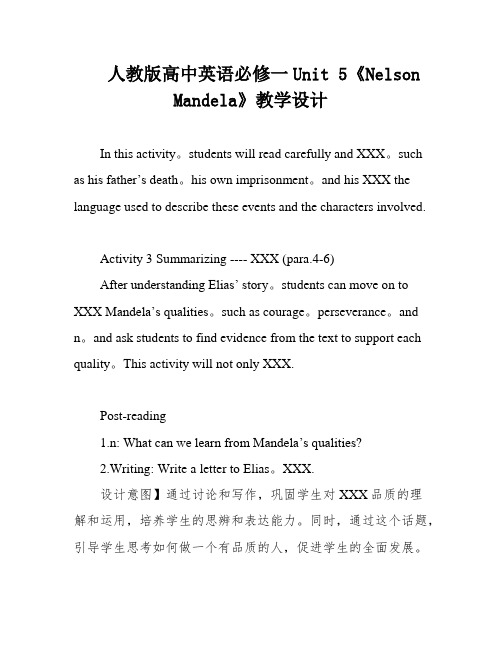
人教版高中英语必修一Unit 5《NelsonMandela》教学设计In this activity。
students will read carefully and XXX。
such as his father’s death。
his own imprisonment。
and his XXX the language used to describe these events and the characters involved.Activity 3 Summarizing ---- XXX (para.4-6)After understanding Elias’ story。
students can move on to XXX Mandela’s qualities。
such as courage。
perseverance。
and n。
and ask students to find evidence from the text to support each quality。
This activity will not only XXX.Post-reading1.n: W hat can we learn from Mandela’s qualities?2.Writing: Write a letter to Elias。
XXX.设计意图】通过讨论和写作,巩固学生对XXX品质的理解和运用,培养学生的思辨和表达能力。
同时,通过这个话题,引导学生思考如何做一个有品质的人,促进学生的全面发展。
C。
During XXX。
black people were forced to live in the poorest areas.D。
The living ns of black people were so poor that they couldn't even grow their own food.2.The n asks why Elias would still blow up buildings despite the risk of imprisonment。
教案Unit5 Nelson Mandela
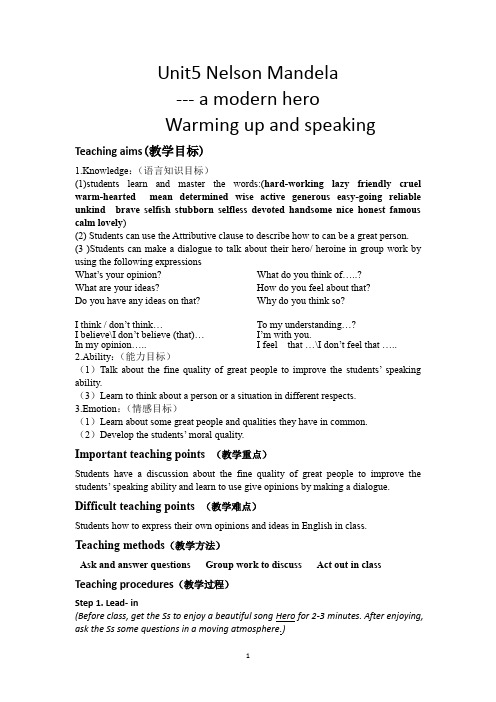
Unit5 Nelson Mandela--- a modern heroWarming up and speaking Teaching aims(教学目标)1.Knowledge:(语言知识目标)(1)students learn and master the words:(hard-working lazy friendly cruel warm-hearted mean determined wise active generous easy-going reliable unkind brave selfish stubborn selfless devoted handsome nice honest famous calm lovely)(2) Students can use the Attributive clause to describe how to can be a great person.(3 )Students can make a dialogue to talk about their hero/ heroine in group work by using the following expressionsWhat’s your opinion?What are your ideas?Do you have any ideas on that? What do you think of…..? How do you feel about that? Why do you think so?I think / don’t think…I believe\I don’t believe (that)…In my opinion…..To my understanding…?I’m with you.I feel that …\I don’t feel that …..2.Ability:(能力目标)(1)Talk about the fine quality of great people to improve the students’ speaking ability.(3)Learn to think about a person or a situation in different respects.3.Emotion:(情感目标)(1)Learn about some great people and qualities they have in common.(2)Develop the students’ moral quality.Important teaching points(教学重点)Students have a discussion about the fine quality of great people to improve the students’ speaking ability and learn to use give opinions by making a dialogue. Difficult teaching points(教学难点)Students how to express their own opinions and ideas in English in class. Teaching methods(教学方法)Ask and answer questions Group work to discuss Act out in class Teaching procedures(教学过程)Step 1. Lead- in(Before class, get the Ss to enjoy a beautiful song Hero for 2-3 minutes. After enjoying, ask the Ss some questions in a moving atmosphere.)T: Well, for a beautiful song, do you know what it is about?S :HeroQ: Who is your hero/heroine?/ Who do you admire in your heart?Ss: …Q: Why?S: …Qs: Do you think he/she is a famous man? Does he/she a great person?S: …Step2:Warming up(Show pictures in talking part one by one)Qs: How about this person? Do you admire him/? Is he another hero in your heart? What do you know about him? Do they great people? Does famous person mean great person? What qualities does a great person have?(Give background knowledge and then ask students to discuss and conclude what adjectives can describe a great person and how to use the attributive clause to express how to a great person.)Conclusion: Let Ss say: I think a great person is someone who is +adj._____________ In my opinion, a great person is someone who never+v.St ep3 SpeakingFirstly,students learn the expressions on how to give opinions.Secondly, students work in group to make a dialogue to talk about their hero.(Give some pictures of people and background knowledge to students)For example:A: Who is your hero?B: Nelson Mandela is my hero. He was born in South Africa.A: What do you think of him ?B: In my opinion, he helped the black people in South Africa to get equality. He is unselfishA: Does he a great person?B:Yes I think so. He sets a good example to us. We can learn from him.B: What about you ? Who is your hero?A:…………Thirdly, ask students in team work to write down the dialogue in a piece of papers . After 5minutes , ask them to act out it in class.Step4 SummeriseUse1/ 2 minutes what students have learned in this class.Step5 Homework1.Memorize new words and phrases.2.Surf the internet or read books to find some information about Nelson Mandela.3. Preview Elia’s Story.。
高中英语 Unit 5 Nelson Mandela教案人教版必修一

Unit 5 Nelson Mandela – a modern hero教学设计Contents 目录一、单元教学目标和要求(Teaching aims and demands)二、教材内容分析〔Analysis of the teaching materials〕三、教学安排(Teaching arrangements)四、单元预习任务(Pre-unit Activities: Preview Task)五、教学步骤(Teaching procedures)六、背景参考资料(Background knowledge)七、评价与反思(Assessment and reflection)一、教学目标和要求(Teaching aims and demands)根据课程标准实验教材〔英语必修〕关于总目标的具体描述,结合高一学生实际和教材内容,我们将教学目标分为语言知识、语言技能、学习策略、情感态度和价值观四个方面。
1.语言知识〔Knowledge〕词汇〔Vocabulary〕:能理解、内化、运用以下生词----hero, quality, willing, active, republic, fight, peaceful, prison, prisoner, period, law, advise, continue, fee, g old,youth,league,stage,vote,position,accept,violence,equal,blanket,degree,guard,educated,terror,fear,cruelty,reward,right〔n.〕,criminal,leader,president,sentence〔v.〕,sincerely短语(Phrases and expressions):lose heart, in trouble ,worry about, out of work, Youth League, as a matter of fact, blow up, put ... in prison, e to power , set up , be sentenced to功能(Functions):学习掌握一些用于发表意见与评论的结构句式,如:1.发表意见〔Giving opinions〕Why do you think so? What do you think of ...? What's you opinion?agree / don't agree.I think / don't think .... I prefer .... In my opinion .... I'm afraid ....2.评论〔Making ments〕Good idea! That's an excellent idea.语法(Grammar):定语从句〔II〕〔由where, when, why, 介词+ which, 介词+ whomThe reason why I got a job was because of my hard work.…we were put in a position in which we had either to accept we were less important, or fight the Government.The person to whom you should be grateful for a peaceful South Africa is Nelson Mandela.扩展词汇:negative(消极的), heroine(女主角,女主人公), unwilling(不情愿的), nation(国家,民族), sacrifice(牺牲),realize〔认识到〕, give up〔放弃〕, riches〔财富〕, Bible〔圣经〕, revolution〔革命〕, career〔职业〕, equality〔平等〕, fairness〔公平〕, conflict 〔冲突〕, biography〔自传〕, beliefs〔信仰〕, Christianity〔基督教〕, religion〔某某〕, priests〔牧师〕, version〔翻译〕, readable〔易读的〕, adventure〔冒险〕, scholar 〔学者〕, sympathy〔同情〕, ,campaign〔从事活动〕,munist〔共产主义者〕, injustice 〔不公平〕, oppose〔反对〕, pilot〔飞行员〕, boycott〔联合抵制〕。
- 1、下载文档前请自行甄别文档内容的完整性,平台不提供额外的编辑、内容补充、找答案等附加服务。
- 2、"仅部分预览"的文档,不可在线预览部分如存在完整性等问题,可反馈申请退款(可完整预览的文档不适用该条件!)。
- 3、如文档侵犯您的权益,请联系客服反馈,我们会尽快为您处理(人工客服工作时间:9:00-18:30)。
新人教版-英语-必修一- Unit 5 Nelson Mandela-amodern hero 教学案设计-------A sample plan for Warming up and Reading教师:丰都职业教育中心张薇年级:高一课题名称:新人教版-英语-必修一Unit 5 Nelson Mandela-amodern hero教学内容:Warming up and Reading一.教材分析:本节课的教学内容是必修一第五单元的Warming-up和Reading,以Reading为主。
本课例是高一第五单元的Warming up 和Reading 部分。
热身部分列出了一些形容词,要求学生从中选择一些来描述伟人,引导学生思考伟人应具有的品格,这样的安排既突出了本单元的主题——伟人的品格,又体现了本单元的功能项目——发表意见与评论。
阅读课文的主要内容是围绕当代英雄——南非前总统曼德拉展开的。
课文借穷苦的黑人工人Elias的口吻讲述了南非黑人所受到的不公正待遇以及他们争取种族平等的斗争情况,介绍了1952—1963年期间的曼德拉,从侧面向学生展示了他的高贵品质。
这样的写法有别于惯常所采用的平铺直叙,虽然只反映出曼德拉的一个侧面,但读起来却更亲切感人,引人入胜,还留给学生更多的思考空间。
本篇阅读课文围绕“ Nelson Mandela----a modern hero 为话题,目的在于使学生了解一个伟人应具备怎样的品质,要求学生掌握阅读方法和技巧,在有限的时间里最大限度地获取信息,让学生尝试“自主学习、主动思考、乐于协作”。
二.教学案设计Teaching aims:Knowledge aims:1. Get the students to learn to learn the following words to describe a person: kind, brave,determined, diligent, wise, friendly, warm, hard-working,strong-minded, generous, cheerful;2. Get the students to know the qualities of a great person;3. Get the students to learn about Nelson Mandela.Ability aims:1. Develop the students’ reading ability and let them learn different reading skills;2. Get the students to learn to grasp the main idea of a text or a passage.Emotional aims:1. Enable the students to know about some great people and learn their noble qualities.2. Get the students to learn from Nelson Mandela to develop their moral qualityTeaching important points:Get the students to know about the qualities a great person should haveEnable the students to learn about Nelson Mandela;Get the students to learn different reading skills.Teaching difficult points:Develop the students’ reading ability.Enable the students to grasp the main idea of a text and learn how to describe a person; Enable the students to be clear about the structure of a passage.Teaching methods:1. Demonstration method.演示法2. Task-based teaching and learning 任务教学法3. Cooperative learning:合作学习Teaching aids:1. The multimedia and the Internet;2. Other normal teaching tools.Teaching procedures:教学过程Step1: Lead inLet the students enjoy a song “Hero”, showing a MV and the lyrics on the screen, makethe students enjoy the words:There's a heroIf you look inside your heartYou don't have to be afraidOf what you areThere's an answerIf you reach into your soulAnd the sorrow that you knowWill melt awayAnd then a hero comes alongWith the strength to carry onAnd you cast your fears asideAnd you know you can surviveSo when you feel like hope is goneLook inside you and be strongAnd you'll finally see the truthThat a hero lies in youThen ask the students to discuss the question “Who is hero?”Step2: Warming up: Guessing GameFirst, show some sentences describing some famous or great people to ask the students to guess who they are. Second, play a game. Show them some pictures of persond and adjectivesto describe these persons, asking a student from each group to guess who they are while others in groups are describing the persons. Third, discuss some questions in groups, showing the following questions: Are famous people also great people? Are great people also famous people? The result of the discussion: Great people are important in a long history;famous people are important in a certain time.Step3: Pre-reading1.Let the students enjoy video about how Nelson Mandela spent his life in Robben IslandThen ask the students the question: what qualities should a great person have?2. Show some brief information about Nelson Mandela.Step4: Reading1. Ask the students to read the title of the passage and ask them to guess the relationship between Elias and Nelson Mandela.(Answer: Friends)2. Fast reading:Task1: Listen to the tape and try to get the general idea of the text.Task2: ask the students to read the passage as quickly as they can and find out how to divide the passage into two parts and get main idea of each part:Part 1: Paragraph(1-2) the life of Elias’life before he met Nelson Mandela.Part 2: Paragraph (3-5) the l ife of Elias’life after he met Nelson MandelaTask3: Matching the main idea of each paragraph.3. Careful reading: Give the students five minutes, ask them to read the text carefully to locateparticular information and then finish the following tasks:Task1: Finish Exercise1 on P35Task2: Do the exercise on the screen: ask the students to read the first part and find the(12.He met Nelson Mandela. 1963:Elias helped Mandela blow up some governmentbuildings.)Step5: After-reading:Task1:DiscussionQuestion1: What can we learn from Nelson Mandela?Question2: How to be a great person?Task2: Read and recite“were put into a position in which we had either to accept we were less important, or fight the government. We chose to attack the laws. We first broke the law in a way which was peaceful; when this was not allowed…only then did we decide to answer violence withviolence.”Step6: Consolidation: summary.Show a short passage on the screen and ask the students to fill in the blanks:Nelson Mandela was the first black president of South Africa. He ____all his life to making black and white people _____. In 1952, he ____a law office to offer ____ to the poor black people on their _____ problems. Elias was helped by him when he was ______ and then he became more _____ about his life. Later when Mandela organized the ANC ____ he joined it as soon as possible and fought together for the equal rights. They first broke the law in a ____ way. Only when that was not allowed ____decide to answer violencewith_____._________, Elias didn’t like violence, but he was happy to help _____ some of thegovernment buildings because of their dream.(Answers: devoted; equal; set up; guidance; legal; in trouble; hopeful; Youth League;peaceful; did they; violence; As a matter of fact; blow up)Step7: Homework1.Find out useful words and expressions in the text;2. A writing task:Try to retell Elias’ story, using the following words:Before meeting Mandela: born, began school, leave got a job, worried about, out of work;After meeting Mandela: get, stay, joined the ANC Youth League, blow up, put in prison Step8: Enjoy a video about a song “Glories Days” by Huang Jia Ju, telling them that the song was written for Nelson Mandela. 欣赏黄家驹的“光辉岁月”这首歌,告诉学生这首歌是黄家驹在1993年曼德拉活得诺贝尔和平奖时所写,从歌词和画面中感世界人民对曼德拉的敬意。
